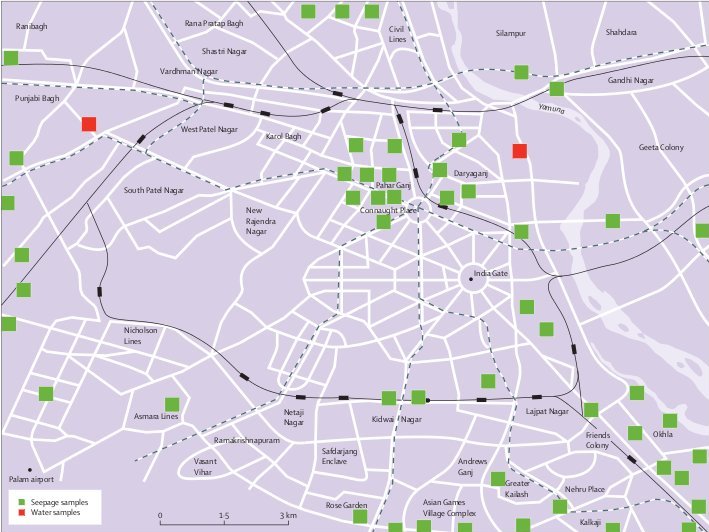Plasmid-encoding Carbapenemase-resistant Metallo-B-Lactamase (PCM or NDM-1) is an enzyme that makes bacteria resistant, not only to a broad range of antibiotics such as carbapenems and other β-lactam, but also to multiple other antibiotic classes, leaving very few treatment options available, when a person gets infected with such bacteria.

Map of NDM-1-positive samples from New Delhi centre and surrounding areas
Plasmids carrying the gene for this carbapenemase, can have up to 14 other antibiotic resistance determinants and can transfer this resistance to other bacteria, resulting in multidrug-resistant or extreme drug-resistant phenotypes. Resistance of this scale can have serious public health implications because much of modern medicine is dependent on the ability of antibiotics, to treat infections.
The paper argues that a number of previous studies have indicated that NDM-1 is widely disseminated in the Indian subcontinent. The available evidence also points at the possible transmission and repeated import of NDM-1 positive bacteria from the Indian subcontinent to Europe, Asia, Canada, USA and Australia through transfers of patients. This evidence provided a strong case for this study that aimed at measuring prevalence of the NDM-1 gene in the water samples in city of New Delhi, India.
This study examined 171 seepage samples and 50 tap water samples from New Delhi and 70 sewage effluent samples from Cardiff Wastewater Treatment Works. The study found a high level of contamination of water acquired from drains and public taps across the city of New Delhi with bacteria carrying the NDM 1 gene (New Delhi metallo beta-lactamase).
Two of the fifty drinking water samples and twelve of the one seventy one seepage samples were found to be contaminated with the NDM 1 gene according to the study. Further tests also showed that the gene had spread to bacteria causing cholera and dysentery making them potentially untreatable.
The paper ends by arguing that the presence of NDM-1 β-lactamase-producing bacteria in environmental samples in New Delhi has important implications for people living in the city who are reliant on public water and sanitation facilities. Besides this, the poor sanitation situation in the country can further speed up the transmission of the bacteria making people from within the country as well as travellers and visitors coming to the country vulnerable to infections, with enzyme harbouring bacteria.
The study calls for the urgent need to:
- Conduct further epidemiological and environmental studies in the Indian subcontinent to know the extent of the problem
- To establish international surveillance of resistance incorporating environmental sampling and examination of clinical isolates.
The full text of the article is available for download free of charge, from The Lancet's website, to registered users (registration is free).
/articles/dissemination-ndm-1-positive-bacteria-new-delhi-environment-and-its-implications-human